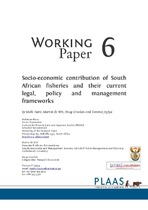| dc.contributor.author | de Wit, Martin | |
| dc.contributor.author | Hara, Mafa | |
| dc.contributor.author | Crookes, Doug | |
| dc.contributor.author | Jayiya, Terence | |
| dc.date.accessioned | 2019-03-11T09:15:08Z | |
| dc.date.available | 2019-03-11T09:15:08Z | |
| dc.date.issued | 2008 | |
| dc.identifier.citation | Crookes, D., de Wit, M., Hara, M., Jayiya, T. (2008). ‘Socio-economic contribution of South African fisheries and their current legal, policy and management frameworks’, Working Paper 6. PLAAS, UWC, Cape Town. | en_US |
| dc.identifier.uri | http://hdl.handle.net/10566/4464 | |
| dc.description.abstract | The Marine Living Resources Act (No. 18, 1998) establishes as an objective the utilisation of marine living resources to achieve, inter alia 'economic growth, human resource development, capacity building within fisheries and mariculture branches, [and] employment creation'. Fisheries policy is founded on two fundamental principles: 1) that fisheries resources belong to all of South Africa's people, and 2) that these resources should be utilised on a sustainable basis so that both present and future generations may benefit from them. The Act, and subsequent amendments, permits the extension of rights to undertake commercial or subsistence fishing, engage in mariculture, or operate a fish-processing establishment.
As in most other fishery areas in the world, South Africa's management authorities face a growing need for the incorporation of socio-economic information in the management of fisheries. Social and economic contexts vary by fishery and, therefore, policy and management regimes differ among the sectors. There is a need to clearly understand the different contributions to the social and economic well-being of the fisheries so that appropriate management objectives and priorities may be developed.
Taking the above into consideration, it thus becomes obvious that managing commercial, small-scale and subsistence and recreational fishers; the environment; meeting seafood consumer expectations; and developing appropriate political responses, will require carefully planned social and economic research in addition to the more traditional biological research.
The purpose of this paper is to contribute to our understanding of the socio- economic contribution of fisheries to South Africa's economy and legal, policy, and management context within which the three main South African fisheries sectors (commercial, small-scale/subsistence, and recreational) operate'. | en_US |
| dc.language.iso | en | en_US |
| dc.publisher | Institute for Poverty, Land and Agrarian Studies, University of the Western Cape | en_US |
| dc.relation.ispartofseries | Working Paper;6 | |
| dc.subject | Sustainability | en_US |
| dc.subject | Marine Living Resources Act (No. 18, 1998) | en_US |
| dc.subject | Socio-economics | en_US |
| dc.subject | Fisheries | en_US |
| dc.subject | Economy | en_US |
| dc.title | Socio-economic contribution of South African fisheries and their current legal, policy and management frameworks | en_US |
| dc.type | Working Paper | en_US |

